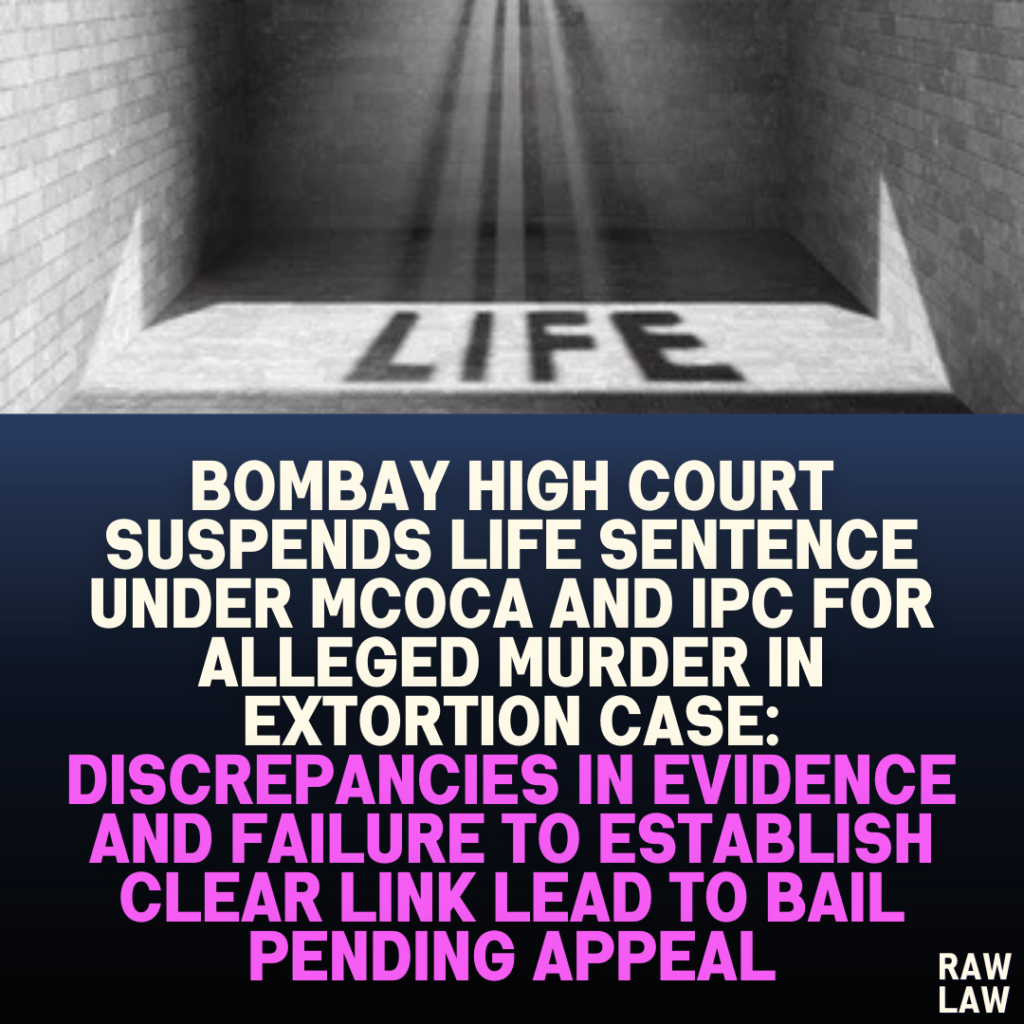Court’s Decision:
The Bombay High Court has allowed an application for bail, suspending the execution of the life sentence awarded to the applicant under sections 302 r/w 120B of the Indian Penal Code (IPC) and under sections 3(1)(i), 3(2), and 3(4) of the Maharashtra Control of Organized Crime Act (MCOCA). The court ruled that the applicant should be released on bail pending the appeal, citing the considerable time it may take for the appeal to be heard and the inadequacy of evidence linking the applicant directly to the crime.
Facts:
The case concerns the murder of a hotelier who was shot dead in his hotel on May 4, 2001, allegedly by members of an organized crime syndicate led by the applicant. The prosecution claimed that the murder was carried out because the hotelier failed to pay extortion money demanded by the applicant. Various accused, including the alleged shooter, were prosecuted and convicted under MCOCA and IPC. The applicant, who had been deported from Indonesia in 2015, was also charged for his involvement in the murder conspiracy.
Issues:
- Whether there was sufficient evidence to implicate the applicant in the murder and extortion scheme.
- Whether the conviction under the stringent provisions of MCOCA was legally valid, given the prosecution’s reliance on circumstantial evidence and the alleged failure to establish a direct nexus between the applicant and the crime.
Petitioner’s Arguments:
The petitioner (applicant) argued that there was no direct evidence linking him to the murder or the extortion demands. His counsel pointed to discrepancies in the evidence, arguing that the Special Judge had improperly relied on prior convictions of other accused in a different trial, which was legally impermissible. It was further argued that the Special Court failed to appreciate material contradictions in the testimonies of key witnesses and that the confessional statement of a co-accused was inadmissible.
Respondent’s Arguments:
The prosecution contended that the applicant, as a notorious criminal with multiple cases to his discredit, was intricately involved in the organized crime syndicate responsible for the murder. They relied on the testimony of witnesses and prior threats made by the applicant’s henchman to support the conviction.
Analysis of the Law:
The court examined the evidentiary issues, particularly the reliance on circumstantial evidence and prior trials involving different accused. The court also considered whether the Special Judge had erred in admitting confessional statements and whether the prior approval for prosecution under MCOCA was validly obtained.
Precedent Analysis:
The court referred to the Supreme Court’s ruling in Mydeen and another vs. Assistant Commissioner of Customs, emphasizing that confessional statements made in separate cases cannot be used against an accused who was not jointly tried. Additionally, it invoked principles from Ziyauddin Burhanuddin Bukhari vs. Brijmohan Ramdass Mehra, which set strict criteria for admitting tape recordings as evidence.
Court’s Reasoning:
The court found that there were significant discrepancies in the evidence presented by the prosecution. It questioned the admissibility of certain documents and testimonies relied upon by the Special Court. The court also highlighted the prosecution’s failure to examine key witnesses and establish a clear link between the applicant and the extortion demands that led to the murder.
Conclusion:
The court concluded that there was a reasonable basis for suspending the execution of the applicant’s sentence, particularly in light of the insufficient evidence linking the applicant to the crime. The court granted bail, subject to certain conditions, including the surrender of the applicant’s passport and the provision of a bond of Rs.1,00,000/- with solvent sureties.
Implications:
This decision underscores the rigorous standards of evidence required in cases involving organized crime. The court’s ruling on the inadmissibility of evidence from separate trials and its scrutiny of the prosecution’s failure to follow procedural norms could have broader implications for how MCOCA cases are prosecuted in the future.
